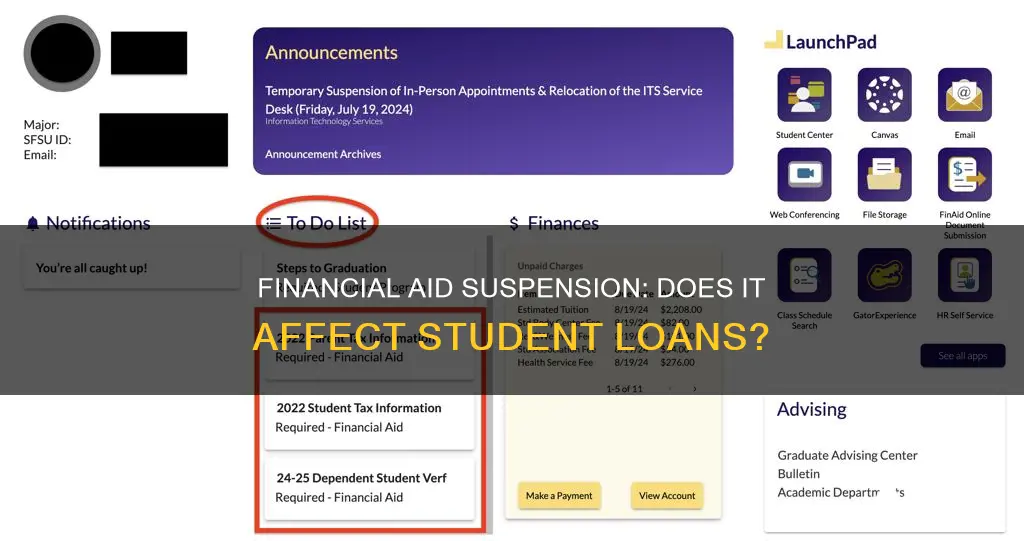
Financial aid is crucial for students to afford the rising costs of postsecondary education. Unfortunately, financial aid can be suspended or cut off for various reasons, such as poor academic performance, changes in financial status, or failing to meet Satisfactory Academic Progress (SAP) requirements. This can be devastating for students, potentially forcing them to discontinue their academic programs or trigger student loan repayment. It is important to understand the cause of financial aid suspension and take corrective actions, such as filing an appeal or improving academic standing, to restore financial aid and continue their education.
| Characteristics | Values |
|---|---|
| Reasons for financial aid suspension | Poor academic performance, switching schools, not taking enough credits, defaulting on other student loans, citizenship status changes, conviction for a crime or drug offense, invalid high school diploma, property subject to a judgment lien, changes in financial status, failing to maintain Satisfactory Academic Progress (SAP), increase in income, withdrawal from too many classes, exceeding the allowable time to complete a degree |
| Impact of financial aid suspension | Loss of access to student loans, grants, and other sources of federal aid; start of repayment period for existing loans |
| Options after financial aid suspension | Appeal the suspension, work with the school's financial aid office, improve academic performance, apply for a new financial aid package at a new school, take out private student loans, apply for non-federal scholarships or other alternatives, reconsider living and eating on campus |
What You'll Learn

Does changing schools or majors affect financial aid suspension?
Changing schools or majors can affect financial aid suspension, but the outcome depends on several factors. Firstly, let's address changing schools. If your financial aid has been suspended at one school, it is possible to apply for a new financial aid package at a different school. However, your academic record will be scrutinised by the new school, and if your previous aid was suspended due to poor academic performance, this could negatively impact your eligibility for aid at the new institution. Each school has its own Satisfactory Academic Progress (SAP) policies, which outline the academic requirements necessary to maintain financial aid eligibility. Therefore, it is crucial to understand the SAP requirements of any school you consider transferring to and work on improving your academic standing.
Now, regarding changing majors, this too can influence your financial aid status. The impact of changing majors on financial aid depends on the conditions of your award. If your financial aid package stipulates completing your degree within a specific timeframe, changing your major, especially if it is unrelated to your previous course of study, can add a significant number of new credit hours, extending your graduation timeline. Consequently, if you exceed the average time to complete your degree, your federal financial aid may be cut off. Moreover, if you have received scholarships or grants tied to specific majors or merit-based criteria, changing your major could put those awards at risk. Therefore, it is advisable to consult with your college or university about their policies on changing majors while maintaining financial aid eligibility.
Stafford Loans: Eligibility and Financial Aid Impact
You may want to see also

What are the eligibility requirements to avoid financial aid suspension?
To avoid financial aid suspension, students must meet the eligibility requirements set by the Department of Education. These requirements include maintaining satisfactory academic progress (SAP), enrolling in a certain number of credit hours, and achieving passing grades. Students must also ensure that they are not in violation of any other eligibility criteria, such as changes in citizenship status, criminal convictions, defaulting on previous student loans, or providing an invalid high school diploma.
Maintaining SAP is crucial, as it demonstrates that students are making progress toward completing their degree or certificate within a certain timeframe. SAP policies vary by school, but generally, students are required to maintain a minimum GPA of 2.0 on a 4.0 scale, which is equivalent to a "C" average. Some schools may have higher GPA requirements for scholarship recipients. Students should refer to their school's website or contact the financial aid office to understand the specific SAP policy that applies to them.
In addition to academic performance, eligibility for financial aid is also determined by financial factors. Students must complete the Free Application for Federal Student Aid (FAFSA) to assess their Expected Family Contribution (EFC) and determine their eligibility for federal loans and other types of financial aid. A significant increase in income, as reported on the FAFSA, can lead to a reduction or loss of financial aid. Therefore, students should carefully review the eligibility criteria and maintain their academic and financial standing to avoid financial aid suspension.
Furthermore, students should be mindful of other factors that can impact their financial aid status. For example, switching schools or majors may result in losing eligibility for the original financial aid package. Additionally, students must ensure they are enrolled at least half-time in their academic program to maintain eligibility. If students drop below half-time enrollment, they may need to increase their credit hours to regain or maintain financial aid.
By understanding and adhering to the eligibility requirements, students can take proactive steps to maintain their financial aid and avoid suspension. It is important to stay informed about the specific criteria and policies of the school and financial aid programs to ensure continued access to funding for their education.
Understanding Excess Distribution: Loan Basis Included?
You may want to see also

How does income increase impact financial aid suspension?
A financial aid suspension occurs when previously granted aid is halted due to various reasons. This can include unsatisfactory academic progress, changes in your financial status, or even defaulting on other student loans. In the case of an income increase, a higher Expected Family Contribution (EFC) may reduce the amount of aid you're eligible for or even eliminate eligibility for most aid altogether.
The financial aid available to you is based on both your EFC and the Cost of Attendance (COA) as determined by your school. A significant increase in your income or your parents' income can impact your EFC, leading to a reduction in the amount of financial aid you receive or even a suspension of your eligibility for most aid. This is because your EFC is calculated based on factors such as parental income, assets, household size, and the number of family members attending school simultaneously.
If your financial aid has been suspended due to an increase in income, you may have the option to appeal the decision. You can submit a financial aid suspension appeal if you believe there are extenuating circumstances and your family cannot contribute as much as expected. However, it's important to note that even with an appeal, you may not be able to regain your previous level of financial aid if your circumstances have changed significantly.
Alternative options for funding your education
If you are unable to reinstate your financial aid, there are alternative options to consider for funding your education:
- Private student loans: You can explore private student loans from lenders, but these typically require a credit check and may not offer the same protections as federal loans.
- Grants: Grants are another option to help cover the cost of your education.
- Income-share agreements: Income-share agreements provide funding in exchange for payments based on a percentage of your income after graduation.
- Part-time or full-time employment: Depending on your course load, you may be able to work to supplement your income and cover your educational expenses.
- Transfer to a more affordable school: Transferring to an online school, community college, or state university can help reduce your overall expenses and make your education more affordable.
Loan Plans for Doctors: Fifth Third's Great Offerings
You may want to see also

What are the steps to appeal financial aid suspension?
Financial aid is crucial for students to fund their education, so it can be devastating if your financial aid gets suspended. The first step to appealing a financial aid suspension is to understand the cause of it. There are several reasons why your financial aid may be suspended, including:
- Poor academic performance
- Switching schools or changing majors
- Not taking enough credits to qualify for the aid
- Defaulting on other student loans
- Conviction of a crime
- Not having a valid high school diploma
- Having property subject to a judgment lien
- Changes in your or your family's financial status
Once you understand the cause of your financial aid suspension, you can take steps to appeal the decision. Here are some general steps to appeal financial aid suspension:
- Contact your school's financial aid office: The financial aid office at your school can provide specific information about the appeal process and help you understand your options.
- Identify the reason for your suspension: As mentioned earlier, understanding the cause of your suspension is crucial. Different reasons may require different approaches to the appeal process.
- Gather supporting documentation: If your suspension was due to extenuating circumstances, such as mental health issues or family emergencies, gather documentation to support your appeal. This could include medical records, hospitalisation records, therapist's notes, or other relevant evidence.
- Complete any required forms or appeals processes: Your school may have specific forms or processes for appealing financial aid suspensions. Follow the instructions provided by your school and be thoughtful and reflective in your responses. Explain why you were struggling and provide a detailed plan for how you will improve and ensure the issue doesn't happen again.
- Seek help: Don't hesitate to seek help from academic advisors, professors, or counselling services. They can provide guidance and support throughout the appeal process and may offer valuable insights or resources.
- Consider alternative options: If your appeal is denied, explore alternative options for funding your education. This could include private student loans, scholarships, or grants. You may also need to reconsider your living arrangements or meal plans to reduce expenses.
Remember that the specific steps to appeal financial aid suspension may vary depending on your school and the reason for your suspension. It's important to stay in communication with your school's financial aid office and seek help when needed.
The Final Loan Approval: What's the Document?
You may want to see also

What are the alternatives to financial aid?
Financial aid can be a lifeline for students, but it can also be taken away for a variety of reasons, including academic performance, changes in financial status, or even criminal convictions. If you're facing a financial aid suspension, it's important to understand the cause and explore alternative funding options to keep your education on track. Here are some alternatives to consider:
Scholarships
Scholarships are a great way to secure funding for your education. They are usually based on merit, such as academic performance, athletic ability, or other talents, and they don't need to be repaid. Local scholarships often have fewer applicants, increasing your chances of receiving funding. Organized groups like the Kiwanis Club or your high school booster club may offer scholarships, and your city government or niche societies might also provide opportunities. Check with your college or university, as some schools grant academic merit scholarships upon acceptance.
Part-time Work
Consider finding part-time employment to help cover your educational expenses. On-campus jobs, such as resident assistant positions or tutoring roles, can provide a convenient source of income and may even offer additional benefits like free housing or reduced-cost meal plans. Off-campus part-time work is another option, allowing you to gain work experience while earning money to fund your education.
Campus Employment
Even if you're not offered a traditional work-study package, campus employment opportunities can help you earn money to cover your costs. These jobs are often flexible and accommodating of your class schedule. Additionally, they provide convenient access to your classes and on-campus activities.
Private Student Loans
Private student loans from banks or credit unions can be an alternative to federal loans. However, they typically require a cosigner and may have higher fees or interest rates. It's important to carefully understand the differences between federal and private loans before committing to the latter.
Additional Needs-based Programs
Explore additional needs-based programs that can provide financial assistance. Government or school programs may be able to help reduce some of your food and healthcare expenses.
Tuition Payment Plans
Inquire about tuition payment plans offered by your educational institution. These plans can help make the cost of tuition more manageable by spreading out payments over a more extended period.
Remember, if you're facing a financial aid suspension, don't hesitate to reach out to your school's financial aid office for guidance and to explore your specific options. They can provide valuable resources and help you understand your next steps.
Fafsa and Loan Providers: Who Chooses?
You may want to see also
Frequently asked questions
Financial aid suspension is when previously granted aid is halted due to various reasons, including poor academic performance, changes in financial status, or failing to meet Satisfactory Academic Progress (SAP) requirements.
The consequences of financial aid suspension can include losing eligibility for student loans or grants, which may impact your ability to continue your academic program. In some cases, it could trigger the start of your loan repayment period.
Yes, you may be able to get your financial aid back after suspension by filing an appeal or demonstrating that you have improved your academic standing and are meeting SAP requirements.
If you are unable to get your financial aid reinstated, you may need to consider alternative funding options such as private student loans, grants, income-share agreements, or part-time/full-time work.
No, financial aid suspension typically refers to the suspension of grants, scholarships, or federal loans. Private student loans are separate from federal financial aid programs, so you may still be eligible for those even if your federal aid is suspended.







